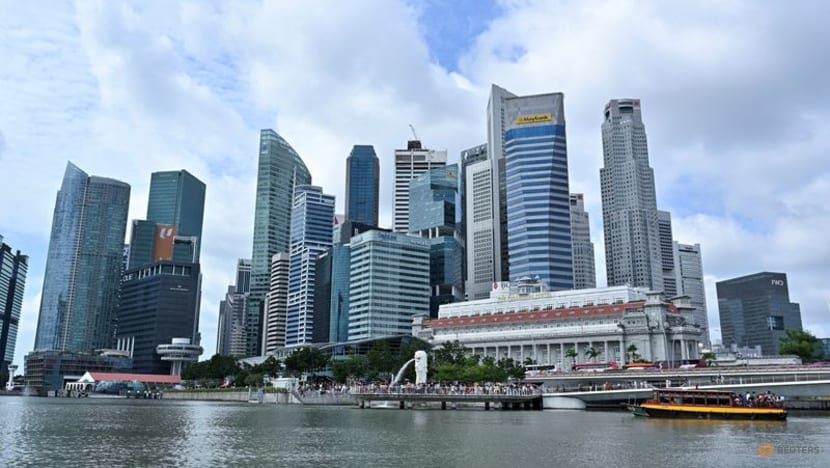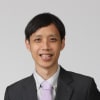Commentary: Forward SG report reveals emerging consensus on Singapore’s future direction
Greater assurance and collectivism are the way forward for Singapore, but we must also strive to sustain competitiveness, says Terence Ho of the Lee Kuan Yew School of Public Policy.

File photo of the skyline in Singapore. (Photo: Reuters/Caroline Chia)

This audio is generated by an AI tool.
SINGAPORE: There were no major surprises in the Forward Singapore report released on Friday (Oct 27), which was the culmination of a 16-month long effort that engaged more than 200,000 Singaporeans in conversations on refreshing Singapore’s social compact.
Many of the findings had already been alluded to by Deputy Prime Minister Lawrence Wong and his fellow fourth generation (4G) political leaders over the past year or so. The input of those engaged has also been factored into the development of new policies and programmes - notably, the revised HDB housing model and forthcoming re-employment support for the involuntarily unemployed.
Forward Singapore has been without doubt the most ambitious and extensive national engagement by Singapore’s political leadership to date. While the consultation process is itself valuable, so too is the output. By crystallising the views and aspirations of society, the Forward Singapore report can serve as a lodestar for Singapore’s leaders to chart the future of the nation.
SEVEN SHIFTS TO SUPPORT INDIVIDUAL AND COLLECTIVE ASPIRATIONS
The emerging consensus is that Singaporeans would like a society that is vibrant and inclusive, fair and thriving, united and resilient. It is one that looks beyond the traditional markers of material success to embrace a broader sense of meaning and fulfilment - a Singapore dream that every citizen can aspire to.
Forward Singapore has identified seven key shifts to enhance individual autonomy, opportunities and choice, while embracing greater responsibility for one another.
This blend of individualism and collectivism can in fact be mutually reinforcing, as it will expand opportunities for individuals to pursue their dreams and fulfil their potential, while spurring them to help others in the community.
Among the seven shifts identified in the report are embracing learning beyond grades, and respecting and rewarding every job.
These shifts reaffirm the direction which Singapore has been taking in recent years to create a more inclusive society with a broader definition of success. At the heart of this effort is greater investment in education and training, all the way from preschool to one’s working years, with more diverse education pathways catering to different needs and preferences.
Lifelong learning will receive a significant boost from the newly announced SkillsFuture credit top-up, training allowances for mid-career Singaporeans, and a second publicly funded diploma.
The Forward SG report is unequivocal about the need to reduce wage gaps across occupations and narrow salary differences between university and ITE graduates. The articulation of this aim is significant: It is a critical step towards a more inclusive workforce and society.
Achieving this will require an upgraded suite of policy tools that includes progressive wages, along with greater societal recognition for workers in the skilled trades and care sectors.
Singaporeans can also look forward to greater guidance and support to plan their careers and tide over periods of unemployment, as well as more opportunities to develop themselves for specialist and leadership roles in their respective sectors.
ASSURANCE AND COLLECTIVE RESPONSIBILITY
Pressing challenges facing Singapore have increased mutual dependency among members of society, making the destinies of Singaporeans more closely intertwined. The success of any firm or individual rides on a wider ecosystem to which everyone contributes.
In this context, Forward SG recognises the need to strengthen mutual support and assurance within a refreshed social compact.
Several of the key shifts identified are in this direction: Supporting families through every stage of life, enabling seniors to age well, and empowering those in need. The initiatives for families are wide-ranging and holistic, spanning material, psychological and social well-being.
They address housing, childcare, mental health, work-life balance and caregiver support, speaking to pain points encountered by many Singaporeans facing pressures at work and home in a fast-paced society.
For seniors, the key thrusts cover financial, housing, healthcare and social needs. The challenge is one of scale, given how quickly this demographic segment is growing, and whether policies and programmes can address the diverse needs of a heterogenous elderly population.
In an inclusive society, all Singaporeans - including the less well-off and those with disabilities - should have agency, dignity and opportunities. The shift from “social assistance” to “social empowerment” is reflected in programmes to equip beneficiaries with skills - whether to better manage finances, improve life circumstances, or bring up children well.
Ensuring greater financial security will require a step-up in government social support programmes. Also necessary is a whole of society effort: Businesses adopting fair and progressive employment, community organisations partnering the government in delivering support for those in need, and donors and volunteers also chipping in with their resources, time and expertise.
All members of society must contribute towards strengthening multiracialism and a national identity in order to build a shared future. Underscoring the commitment to greater civic participation and policy co-creation, a new Singapore Government Partnership Office will be set up to engage citizens and support ground-up community initiatives.
KEEPING SINGAPORE COMPETITIVE
The challenge facing Singapore is how to step up collectivism without losing the drive and metaphorical hunger that are critical to sustaining competitiveness.
Although not among the seven shifts, keeping the economy competitive and dynamic will provide the foundation for the various policies and programmes to create more opportunities for Singaporeans.
As the Forward SG report acknowledges, economic growth is necessary to improve wages and living standards, and to provide the resources for social development, while giving Singaporeans hope for a better future.
Competition is key to innovation and progress. Whether in school or at work, some degree of competition is expected and necessary; otherwise, our firms and people would lack the cutting edge to compete in the global marketplace.
Too much competition, however, can have deleterious effects on people and society such as by increasing anxiety and stress, or eroding trust and cooperation. A zero-sum and winner-takes-all mentality, such as when vying for positional goods and status symbols, does nothing to grow the collective pie.
Singaporeans need to leverage competition, but also come together and help one another succeed.
Policy moves to strengthen financial assurance and mutual support will give everyone greater peace of mind. Hopefully, this will not create a culture of dependency, but instead provide a springboard for Singaporeans to pursue their passions with confidence, creating value for society in myriad ways.
An inclusive society should allow people to work at a pace of their choosing, in line with their personal aspirations at each stage of life. Collectively, however, we will need to sustain a strong work ethic and sense of personal responsibility, and give every Singaporean the chance to reach for the stars.
Terence Ho is Associate Professor in Practice at the Lee Kuan Yew School of Public Policy. He is the author of Governing Well: Reflections on Singapore and Beyond (2023).




















